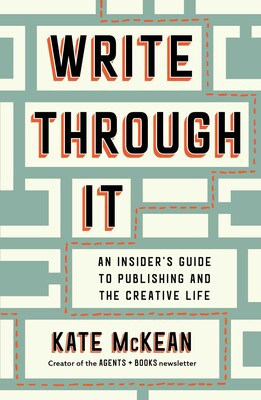Stop Hiding and Start Self-Promoting
An excerpt of "Write Through It: An Insider's Guide to Publishing and the Creative Life" and a video interview with author and agent Kate McKean.
Readers,
Today we’re fortunate to have an excerpt of agent/author (and newsletter writer) ’s excellent new book, Write Through It: An Insider's Guide to Publishing and the Creative Life.
If you’ve never published a book before and want to—and even if you already have—I highly recommend this book. It’s a great guide, from a successful agent at the Howard Morhaim Literary Agency and now an author herself, brimming with helpful advice for every step along the path to publishing.
Kate was kind enough to let me share an excerpt of the book. (Find it below this section.) I chose the chapter called “I Will Teach You to Love Self-Promotion” because I struggle with this myself. You might see me promoting my books and newsletters all over the place and think it’s easy, or I’m some kind of ham, but the truth is, I cringe through it. I hold my nose and do it anyway, because I know that if I don’t promote my work no one else will, and then no one will know about it, or support it. (I regret to inform you that it works. Let Kate tell you how to do it intelligently!)
Kate was also kind enough to let me interview her about the book, and her own path to publishing—this is her debut! Here’s the video from our interview:
Below is Kate McKean’s essay. ⬇️ Thanks for reading, and for all your support! - Sari Botton
I Will Teach You to Love Self-Promotion
by
Are you hiding under the covers? That’s what most writers do when it’s time to talk about self-promotion. I get it. It’s hard to talk about yourself and your work, full stop. It’s hard to do this in a way that doesn’t sound like bragging or begging. We’re all cringing all the time when we have to self-promote. It’s OK. You’re not alone.
Or you’re fine with talking about yourself and your work, online and in person, but you want to make sure you’re doing it effectively and learn how to avoid pitfalls whenever possible. Maybe you’ve tried one way in the past and it didn’t work and you don’t know what to do next. Maybe you’re excited and just don’t want to fuck it up.
In this chapter we’re going to talk about why you have to do self- promotion, what you can actually do, and how not to crumble into a pile of dust or annoy all your followers every time you suggest people read something you wrote. I promise you can get to an OK place about this or at the very least a neutral place about it. Because if you don’t want to talk about your own work, who will?
How to Make Peace with Self-Promotion
To start, let’s recognize that promoting yourself brings up complicated feelings. I mean, I love to talk about myself, as an agent and a writer, but that’s because I am the youngest child, a natural ham, and a Leo Moon. Also, I’ve gotten used to it over the last twenty years of my career because I’ve seen what good it can do for me and my clients. Whether you’re dreading it or cautiously optimistic about it, here’s how to integrate promoting your book into your writing life.
IT’S NOT ALL SOCIAL MEDIA—JUST MOSTLY
As we talk about self-promotion, let’s admit that we’re mostly, but not exclusively, talking about social media, however that exists when this book comes out. This is where most writers start because these have the lowest barriers to entry. They’re right at our fingertips, on our phones and computers. Social media sites, however, are not neutral places. They can be unsafe for some, especially marginalized communities, and can adversely affect anyone’s mental health. If you are unsafe on any plat- form, you do not have to be there. If one makes your life noticeably worse, get off it. Your health, safety, and sanity are more important than posting “Buy my book!” Everyone will understand if this is the case for you. There is no evidence that says You will sell [x] fewer copies if you’re not on all the platforms. You’ll find what works, safely, for you.
If you merely hate a specific platform, you also don’t have to be there! If you are loathe to make short videos, then you do not have to be on TikTok. In fact, you shouldn’t be, because hate will make you create bad content, and bad content will not help you promote your stuff. It’s OK to factor in your personal preferences and skills when it comes to self-promotion. As I finished this book, I contemplated making Reels or TikToks as part of my promotional strategy. I absolutely did not want to do fifty takes or spend hours a week editing just to get one thirty- second video. I mentioned this on my newsletter, and my helpful readers reminded me that many of these kinds of videos don’t show the creator’s face and can be more, shall we say, loosely edited. This was a big relief! While on a long flight, I experimented by making a Reel of me writing out a query tip on my tablet. I put some music behind it. That was it! It took me about six takes and forty-five minutes to do the whole thing, but it was more fun than I thought it would be and much lower stakes. I just might even do it again! You don’t have to do any specific form of social media, but you do have to do something. It’s very hard to ignore self-promotion altogether.
How to Build a Platform
And now for the nuts and bolts of building a platform. This is not an exhaustive list of every possible place you can build your platform, online and off, but it’s a lot of the big ones. Your specific genre and area of expertise may lead you to places I don’t even know about. Add those to your list.
ONLINE
Social media. Twitter/X, Facebook, Instagram, Threads, Bluesky, LinkedIn, TikTok, Tumblr, and the site that launched between the time this went to the printer and was shipped to stores. The ones you should be on depend on your audience, genre, and preferences.
It is not if you build it, they will come. Simply being on these platforms will not magically make your platform appear. It takes time and effort. You’ll be frustrated, confused, annoyed, and baffled by what works and what doesn’t. And then the platform will change its algorithm, and you’ll have to relearn how it works all over again.
Do not make your social media handle the name of your book, especially before it’s bought by a publisher. Your title can change multiple times over the publishing process. And what happens when you write your second book? Will you change your handle to that? It’s best to use your name—professional or preferred—whatever works for you.
You can keep your personal and professional social media feeds separate. You can keep your personal ones private, or just private on Instagram and public on TikTok. It’s your choice. I do not generally suggest an author maintain two (or more) fully separate social media accounts for your writing personas, like one for your adult books and one for your children’s books. Or even one for books written under your real name and another under your pseudonym. (Obviously, if there are safety reasons to do this, do it. Your safety trumps all my advice here.) It’s just a lot to maintain. And frankly, your audience probably doesn’t want two of you. They want you all in one place, even if that’s the same place for your space-opera science fiction news and your spicy romance news. Use your judgment on whether separating things might be best for your particular career. But I don’t feel it’s a good reason to maintain multiple personas because you think it’ll be easier. It’s not. In fact, I think it’s more difficult.

NEWSLETTERS/BLOGS
Newsletters have taken over the blog space because social media sucked up everyone’s attention and Google stupidly killed Google Reader. Sorry, I have strong feelings about blogs and their demise. Now that readers need to be brought the content instead of seeking it out themselves, email newsletters have become The Thing. I mean, mine got me this book deal, so I’m not complaining.
Like social media, you don’t have to do a newsletter/blog, and you should not if writing it feels like pulling teeth. You could do one about a defined subject, like books and publishing like I did, or a broader one that may cover several of your interests. If you’re just starting out, I suggest focusing on a clear topic so you can bring in readers interested in that, and it goes without saying that the topic should be related to what you ultimately want to be known for. If you’re writing fiction, you might review books in your genre or something like that. A newsletter that’s full of your random thoughts and pictures of your cat might be fun to write, but unless you have an excellent voice or are very funny (and you’re trying to build a humor platform), it’s going to be hard to pull in an audience. What’s in it for them?
You can monetize your newsletter or not. You can host it yourself on your own website (if you have those skills), or you can use a newsletter network like Beehiiv or Substack. The reader doesn’t usually care where you host it, as long as it’s easy for them to get.
PITCHING ARTICLES
Instead of posting it to your blog, you might pitch your article to a website, newspaper, or magazine. This can help get your name out, especially if you concentrate on a specific area related to your book/genre. The key to pitching, though, is actually reading the publications you want to submit to. That way, you have a better idea of what they’re looking for, so you’re not pitching listicles about office-appropriate fashion to Outside magazine. It’s a lot of work and much more useful for nonfiction writers, but it can really help build your platform. If it makes you nervous, just remember: the worst thing that can happen is they say no. Which is the same answer you get if you never pitch them anything.
Also, don’t work for “exposure.” Get paid. You aren’t going to get rich writing online or print articles (no, not even in the big, glossy magazines and world-famous newspapers), but they can cough up at least a little money. Whatever you’re offered, ask for 25 percent to 50 percent more. Don’t be scared! If they can’t afford to pay you, maybe you can’t afford to write for them.
PODCASTS AND VIDEOS, YOURS OR OTHERS’
You might be a writer, but that doesn’t mean you can’t traffic in audio and/or video content. You can create your own podcast, short videos like on TikTok, or longer ones like on YouTube. If you listen to or watch others’ podcasts or videos, and you think you have something to say that would be useful or interesting to their audience, reach out and ask if you can be a guest! This will be harder before you have any established platform, but if you’re an expert in something or have unique experience to share, it might work. You’re not going to have much luck cold emailing This American Life or We Can Do Hard Things with Glennon Doyle, but there are many more niche venues with wide viewerships and listenerships that can help you get your name out there.
You can start your own too. Widely available apps and tools, not least of all an iPhone, make the learning curve for this easier than ever. But videos and podcasts are a lot of work, and some audiences expect high production values. Like all things platform, these take time to grow, but if you have a particular interest in these mediums and the skills to back it up (or the enthusiasm to learn), they can become big parts of your author life.
IN-PERSON EVENTS (COMMUNITY > PLATFORM)
You can build your platform offline too. I know, we sometimes forget we can connect with people IRL and not just through our screens. This is what could be called old-fashioned networking, but if that makes you cringe, you don’t have to think of it that way. You might attend conferences and sign up to give a talk or organize a panel related to your topic. You might just attend and meet people and form connections that pay off later. You might find places to teach a class or get more involved in professional organizations related to your field. You might take or lead workshops, organize book clubs, start a writers’ group. These areas take the longest to develop, but I think the potential rewards justify the time investment. People like to make a personal connection, and getting out there in the real world is a great place to start.
Another way to look at this is to think of it as building a community, instead of a platform or network. Writers often approach their platform as a collection of people and resources they can call upon when they need something down the road—a blurb, preorders, reviews. This transactional approach might work. You might create a network of people you can ask for blurbs one day. But are you giving just as many blurbs too? Why not? But what if you found that instead of a platform, you became part of a community?







Thank you! I just bought the book.
This is all such great information and advice. Definitely getting Kate's book!